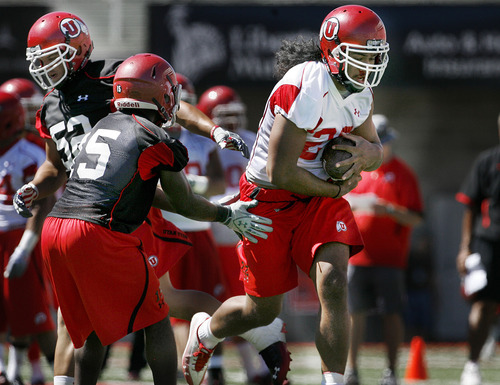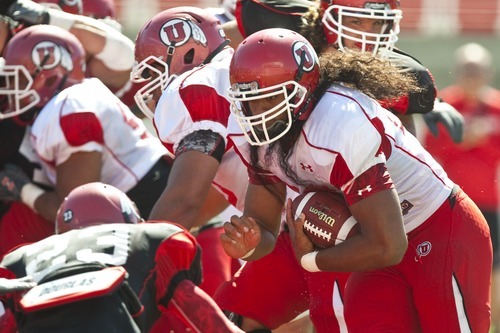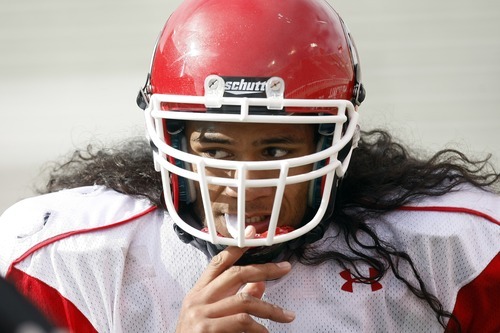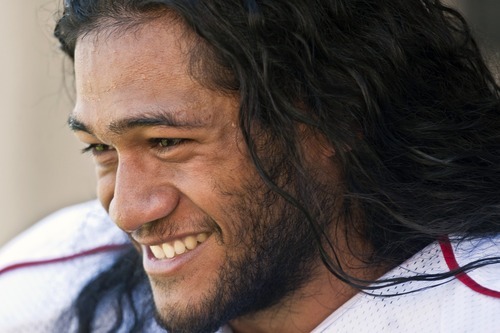This is an archived article that was published on sltrib.com in 2011, and information in the article may be outdated. It is provided only for personal research purposes and may not be reprinted.
Thretton Palamo is a running back waiting to happen.
For the Utes, it can't occur soon enough.
A bruising, athletic, rugby-star-turned-football-player, Palamo is exactly the kind of talent the University of Utah needs while making its jump to the Pac-12.
First-year offensive coordinator Norm Chow believes one key to competing successfully in the new conference rests with the Utes' ability to consistently run the football.
If done effectively, Utah can control the tempo of its games and keep opposing defenses from teeing off on quarterback Jordan Wynn, who comes off shoulder surgery.
Like Chow, running backs coach Dave Schramm knows his group's performance is vital to the Utes' chances against opponents such as Oregon, USC, Arizona State and Stanford.
"You have to run the ball so you're not in third-and-long situations all the time," Schramm said. "It also helps keep your quarterback clean. But so do things like knowing your assignments and picking up blitzes."
That's where Palamo is behind most 22-year-old college sophomores.
He didn't play football until high school and, even then, his focus remained on rugby.
The good news?
Palamo is learning quickly.
Three weeks before the season-opener against Montana State, he remains in the mix for playing time with freshman Harvey Langi, junior college transfer John White and returnee Tauni Vakapuna.
"Thretton's doing a good job," Schramm said. "It just takes time. He's got to learn how to play. And he is learning. He's come a long way — light years since spring ball. But football isn't rugby."
Wynn might be the biggest beneficiary if the 240-pound Palamo develops into an attention-getting running back, which everyone at Utah believes is possible.
"He's still raw," Wynn said. "But he's so big and he's super-athletic. He can run inside, obviously, but he'll turn the corner on you, too."
Palamo was born into a rugby-loving family.
His father, Arona, played at Cal-Davis and was captain of the Samoan national team. His two older brothers have played for USA Rugby.
It's not an exaggeration, however, to call Palamo the best of them all.
At 18, he earned a roster spot on the U.S. national team and, a year later, became the youngest player in the history of the Rugby World Cup.
In fact, Palamo's journey to Utah began while he was playing for the national team. One of his teammates was Blake Burdette, a former Ute football player who is currently the school's rugby coach. When Palamo spoke of going to college, Burdette listened.
Eventually, Palamo decided on Utah over BYU and Cal. He played rugby last year as a freshman, but he also participated in spring football and earned a scholarship.
As a result, Palamo has given up rugby — at least temporarily — to focus on football.
"I'm just so grateful to the coaches for believing in me," Palamo said.
Now the rugby player must continue to develop as a football player, even though the mindset and skills required for one sport don't necessarily translate to the other.
"The second day I came in," Palamo said, "I was trying to block for one of the receivers. But my first instinct was to get on the side of him, so he could pass me the ball.
"Luckily for me, the play was over and the coaches didn't see it. But the receiver and I looked at each other and we were like, 'Yeah, I shouldn't have done that.' "
Running with the ball in rugby is also different than carrying a football.
"Pads make it a different game," Palamo said. "A lot of people think pads will protect you. But all they really do is give the other people a chance to throw their whole body at you without worrying about getting hurt."
As a result, running backs are coached to stay low — close to the ground. But rugby players run more upright so they can see the field and pass the ball.
Said Schramm: "In rugby, Thretton gets tackled high. Nobody tackles him low. In football, it's just the opposite. No one tackles him high. Everybody tackles him low. It doesn't sound like much of a difference, but he's had to get used to that."
As his football education continues, Palamo's goal is to play and contribute to Utah's success.
"Everybody wants to be the starter," he said. "But we have a good group of guys. … Everybody is pushing each other. We want to make each other better because it's a long season and everybody's going to get a touch."
Schramm is confident Palamo will be ready when his turn comes: "He's a hard worker, and I'm extremely impressed with his maturity and desire.
"He's one of those guys who has the inner desire to be great. He'll get better with time, I think, and end up being a heck of a football player."
Thretton Palamo file
Hometown • Sacramento, Calif.
Birthday • Sept. 22, 1988
Pronunciation • THREAT-ten Pa-LA-mo
Class • Sophomore
Position • Running back
Height • 6-2
Weight • 240
Career notes • First played football at Davis (Calif.) High School as a sophomore in 2005. … Competed for Samoa in the Under-19 Junior Rugby World Cup in 2006 and 2007. … Became the youngest player to participate in the Rugby World Cup in 2007. … Played on the USA's Under-20 World Cup team in 2008. … Captained the USA Rugby sevens in the 2009 World Games. … Led Utah's club team to victory in the USA Sevens Collegiate Rugby Championships as a freshman in 2010. … Walked on and quickly earned a football scholarship during spring practice in April.









